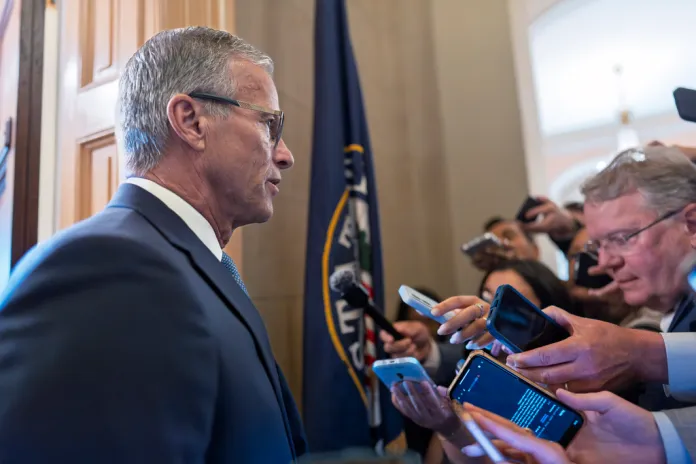


Senate Republican leadership is inching closer toward advancing bipartisan Russia sanctions legislation amid growing concerns that Moscow is unlikely to agree to a peace deal ending the Ukraine war.
Confidence is fading that Russian President Vladimir Putin is serious about peace negotiations after Moscow escalated the war Tuesday with drone attacks on a NATO member’s airspace, intensifying fears the conflict could trigger World War III.
Recommended Stories
- Is immigration policy friction bringing Britain to the brink?
- Qatar demands retaliation against Israel after Doha strike
- McCaul told Israel about 'bad optic' of war continuing
In the face of those concerns, Senate Majority Leader John Thune (R-SD) suggested Wednesday that he is getting closer to bringing a Russia sanctions bill backed by Sens. Lindsey Graham (R-SC) and Richard Blumenthal (D-CT) to the floor for consideration. The legislation would likely have a crippling effect on Moscow’s economy, hindering its ability to finance the war against Ukraine as it would allow Washington to impose a 500% tariff on countries that purchase Russian energy, with China and India atop the list.
The majority leader has repeatedly said he is waiting for a green light from the White House to move ahead with the sweeping sanctions amid President Donald Trump’s effort to achieve a peace deal through different channels, including diplomatic engagement and global tariffs already in place.
However, Senate Republicans are upping pressure on Trump to give his blessing on expanded sanctions as hope is waning that such a deal can be pulled off, with Graham saying he plans to meet with president and Thune this week citing Moscow’s recent strikes within Poland’s airspace as a “provocative act” that has sparked “intensified interest” in bringing the sanctions legislation to the floor for a vote.
As Senate majority leader, Thune has immense control over what legislation is brought to the floor for debate and a vote. He declined Wednesday to confirm that he would immediately bring the sanctions bill to the floor, saying there are still “technical” issues to be resolved.
“I know that there were some technical issues that they were working with the White House to resolve,” he told reporters. “My team was, Lindsey’s folks were involved in all these conversations. … There’s a lot of, I would say, discussion now around we need to move, so we’ll see.”
Another key member of the Senate GOP leadership team said in a report published Thursday that she believed the Graham-Blumenthal bill should be advanced.
“I think it’s time for the sanctions bill to come to the floor,” Sen. Shelley Moore Capito (R-WV) told the Hill. “I think the president’s got to make the final call on that, so I respect that, but I’m ready to vote for that.”
“It’s just a compounding situation,” she continued. “Every time, it looks like Putin’s at the table, and then he turns around and just pounds Kyiv or something like that. I think we’re getting closer on sanctions.”

Other powerful lawmakers, including Sens. Joni Ernst (R-IA); Thom Tillis (R-NC), who co-chairs the Senate NATO Observer Group; and Roger Wicker (R-MS), who is chairman of the Senate Armed Services Committee, have also pressed Trump to back the bill.
In a speech Tuesday, Wicker said the United States “must” be willing to cut off Russia’s oil supply.
“Again, a huge bipartisan majority of senators have said this,” he said. “Russia’s friends are only encouraging his villainy. China is buying and selling with Russia, enabling its war machine. North Korea sent its troops to assist Russian soldiers on the battlefield. Iran designs and supplies weapons. That is a troubling axis of aggressors. … I am ready to work with my colleagues and the president to put real costs on Putin for these war crimes.”
But critical holdouts include Sen. James Lankford (R-OK), another member of Senate leadership, who suggested in comments to CNN that Trump needs more time to see if other strategies could seal an end to the war before escalating international tensions with sanctions.
“President Trump’s trying to use the tariffs right now to be able to provide leverage,” the Oklahoma lawmaker said in a statement published Wednesday. “The next piece on that, if that doesn’t work, is the sanctions piece that obviously has a dramatic effect on our economy and other nations’ economies…So you got to be wise to be able to do that. I think it’s wise to be able to work as many options as you can before we get to that point.”
Even as he has expressed a marked preference for ending the war through diplomatic engagement, holding direct meetings with Putin and Ukrainian President Volodmyr Zelensky, Trump has continually expressed frustrations with both Moscow and Kyiv for holding out on a peace deal.
Trump singled out Putin in a post to social media on Wednesday, expressing anger at the Russian leader for infringing on Poland’s airspace.
“What’s with Russia violating Poland’s airspace with drones?” he wrote on Truth Social. “Here we go!”
His statement comes due to concerns that the Ukraine war could bleed into a larger international conflict, since Kyiv shares a border with four NATO member states, including Poland. An attack on one NATO ally is an attack on all, under Article 5 of the NATO treaty.
BESSENT PRESSES EUROPE TO ALIGN WITH TRUMP’S TARIFF STRATEGY TO END UKRAINE WAR
Poland invoked Article 4 of the NATO charter following the incident, which states that “the Parties will consult together whenever, in the opinion of any of them, the territorial integrity, political independence or security of any of the Parties is threatened.”
The invocation of that treaty provision reflects their anxiety about whether the Russian assault could spill beyond the territory of Ukraine into one of the countries within the trans-Atlantic alliance.
